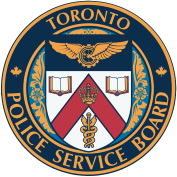
Accommodation
|
DATE APPROVED |
March 25, 2010 (in principle) |
Minute No: P95/10 |
|
DATE(S) AMENDED |
June 15, 2012 August 23, 2018 |
Minute No: P141/12
|
|
REPORTING REQUIREMENT |
Annual |
|
|
LEGISLATION |
Police Services Act, R.S.O. 1990, c.P.15, as amended, ss. 31(1)(c), 47. Human Rights Code, R.S.O. 1990, c. H.19. General, O. Reg. 123/98, Part V. (amended to O. Reg. 43/03) |
|
|
DERIVATION |
|
|
The Toronto Police Services Board is committed to the principle that every person has a right to receive police services without discrimination or harassment, as provided by law, including the Ontario Human Rights Code (the Code).
Further, the Toronto Police Services Board is committed to the principle that all members of the Toronto Police Service (the Service) have a right to work in an environment without discrimination or harassment, as provided by law, including the Code.
The Code provides that every person has a right to equal treatment without discrimination or harassment on the basis of the following grounds, known as the “prohibited grounds”:
|
· Race |
· Sexual Orientation |
|
· Ancestry · Place of Origin |
· Gender identity · Gender expression |
|
· Colour |
· Age |
|
· Ethnic Origin |
· Record of offences |
|
· Citizenship |
· Marital status |
|
· Creed (religion) |
· Family status |
|
· Sex (including pregnancy, breastfeeding) |
· Disability |
The right to equal treatment in services and employment, without discrimination or harassment on the basis of Code-protected grounds, includes the right to “reasonable accommodation” or “accommodation short of undue hardship,” as defined by the Code.
The right to accommodation short of undue hardship arises when it is shown that policies, procedures, or practices discriminate, directly or indirectly, contrary to the Code.
Accommodation with dignity is part of the broader principle that society and its institutions should be structured and designed for inclusiveness. The Code requires that policies, rules, procedures and practices be designed inclusively to allow for maximal participation and inclusion of Code protected groups in employment and services, up to the point of undue hardship.
Adverse impact discrimination may arise where requirements, qualifications, policies, procedures or practices that are neutral on their face (i.e. they apply to everyone equally and single out no one on the basis of a protected ground), nonetheless have a discriminatory impact on the complainant and his or her Code-protected group, of which the individual affected is a member, except where the requirement, qualification or factor is reasonable and bona fide in the circumstances; i.e. where it is demonstrated that the needs of the group of which the person is a member cannot be accommodated without undue hardship on the person responsible for accommodating those needs, considering the cost, outside sources of funding, if any, and health and safety requirements, if any.
Where adversely impacting requirements, qualifications, policies, procedures or practices are demonstrated to be reasonable or bona fide in the circumstances, and, therefore, cannot be more inclusively designed, then exceptions and/or modifications to these standards or rules must be made, up to the point of undue hardship, in order to accommodate the needs of adversely impacted groups protected by the Code.
In employment, the Code recognizes that the right to equal treatment without discrimination is not infringed if the person is incapable, even with accommodation, of performing the essential duties of the job. Therefore, before it is determined that the person cannot perform the essential duties of the job, the Code requires that all reasonable efforts be made to provide accommodation, short of undue hardship, to assist the person in performing the essential duties of the job.
It is the policy of the Toronto Police Services Board that:
- The Chief of Police will develop procedures to deal with requests for accommodation from members of the public and from members of the Service. These procedures will ensure that a process exists to receive, examine, explore and respond to requests and that accommodation is provided in accordance with the principles of dignity and inclusion and will be tailored to the individual who is seeking the accommodation.
- There is both a procedural and substantive component to the duty to accommodate. This means that when faced with a request for an accommodation, there is an obligation to at least consider the request and explore options for accommodation. Failing to do so can result in a finding of discrimination, even if providing the actual or substantive accommodation would have constituted an undue hardship. The Courts have, however, noted that rights claimants have the onus to first establish a prima facie claim of discrimination before this procedural duty of the accommodation provider to explore the situation and possible options takes effect.
- The Chief of Police will ensure that accommodation is provided to the point of undue hardship.
- The Chief of Police will ensure that, as far as possible, Service procedures and practices do not have a direct or indirect discriminatory effect on members of groups protected by the Code.
- The Chief of Police will ensure that appropriate Service members are trained on accommodation principles so that they are able to respond appropriately to requests for accommodation.
- The Chief of Police will report to the Board annually on accommodation requests and measures taken to deal with such requests, including the development of accommodation plans.
accessibility, inclusion, interaction with public, human rights, labour relations